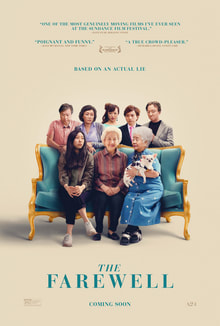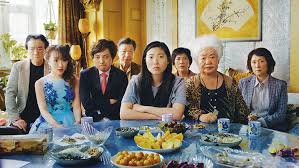|
“The Farewell” stars Awkwafina, Tzi Ma, Diana Lin, Zhao Shuzhen, Lu Hong, and Jiang Yongbo. Released on July 12, 2019, the film is about a family who schedules a wedding celebration in order to spend time with their diagnosed grandmother. The film is written and directed by Lulu Wang, who also directed “Posthumous”. One of the most significant parts of life is the importance of family. Whether they share the same blood or not, the people who are close to you will always support you through the good times and the bad. There are many films throughout the years that depict the strong bond that families have, including the “Fast & Furious” films, but this latest addition to that list could prove to be the best of the bunch, not just story wise, but cultural wise as well. Ever since its release last month, I’ve been waiting for this drama to appear at my closest theater for quite a while, but alas, it got bombarded by sequels, remakes, and book-to-film adaptations. Luckily, it was playing at my second favorite cinema, so I was finally able to see what all the positive hype is about. I’m not familiar with the director’s other works, but I am familiar with the two actors that are in it: Awkwafina, who is known for starring in films like “Ocean’s 8” and “Crazy Rich Asians”, and Tzi Ma, who I only know from “Rush Hour” and “Rush Hour 3”. Those two were practically the main reasons why I wanted to see this film, but are they enough to make it as good as the critics say it was? Based on Wang's real life experience with her own grandmother, the film deals with the complexities of the characters' emotions towards an unfortunate situation and represents family traditions from a Chinese perspective. Even though the film is rated PG (which is actually quite surprising to me), it doesn’t mean that it’s designed for young kids. It treats itself like a film that’s made for adults and filmmaking enthusiasts with its slow pacing and a complex story. The film also contains sequences where the characters speak Chinese with the English subtitles appearing at the bottom of the screen as a form of translation. If you’re not a fan of films with English subtitles, then this one might be a tough sell for you. From my personal point of view, I didn’t mind the English subtitles since it helped me understand what they were saying. All I really care about is the overall experience of the film. Granted, it might not appeal to everyone because of the story, but for those who appreciate the art of filmmaking, it’s a subtle and endearing film that pays respect to the family traditions and paints a well-balanced picture of a family coming together to spend what is possibly the last few days with a loved one. The story is obviously dialogue-driven with characters speaking English and Chinese. While it may sound boring to some people because of the lack of build-up, there’s actually a bigger picture behind it. What made this experience interesting to me was how people from a different culture handled something like this compared to how we deal with it in the United States. While we usually tell someone we love that they’re dying from an illness, people from the Chinese culture did something a little differently, which is not telling them. It sounds odd, but that’s what they do. What also made it absorbing, from my own personal opinion, was how the main character’s internal conflict with the two different cultural traditions affect her relationship with her family. Lulu Wang was able to portray those universally personal themes extremely well with her own visual style that’s filled with grace and passion and a screenplay that’s filled with honesty and emotion. Awkwafina expressed her dramatic side as Billi with brilliant results, which shows that she has a grand future ahead of her as an actress. Tzi Ma also did a great job with his performance as Billi’s father, who is one of the family members who discover their grandmother’s diagnosis. Based on what I’ve seen from him, I hope that he continues to get more roles like this that’ll introduce himself more to American audiences. The main highlight of the cast has to be Zhao Shuzhen as Nai Nai, Billi’s kindhearted grandmother. She’s the source that made the film’s blend of comedy and drama just as heartwarming as a family reunion without making it too sappy or too comical. I don’t know about you readers, but I’m willing to bet that she might get some awards recognition for her thought-provoking performance. What I also liked about the film was the cinematography and the musical score by Alex Weston. The cinematography is just gorgeous to witness as it captures the characters and backgrounds with sheer depth and delicacy, and the music has a nifty way at providing emotion for the sceneries. Overall, “The Farewell” successfully portrays Lulu Wang’s remarkable talent both as a filmmaker and a screenwriter. Ranging from its incredible cast to its respectable screenplay, the film represents an investing and sincere portrayal of a family situation from a different cultural perspective. Again, it’s not going to impress a lot of people. Trust me, I took my sister to see it with me, and even though she enjoyed it, she thought it was boring. But I think it’ll admire people who are passionate for filmmaking and films about life. If it’s playing at a theater near you, I’d say give this one a shot. A
0 Comments
Leave a Reply. |
Home of the most friendly movie reviews on the planet.
Categories
All
Follow Me |
- Home
- Classic Reviews
- 2015 Reviews
- 2016 Reviews
- 2017 Reviews
- 2018 Reviews
- 2019 Reviews
- 2020 Reviews
- 2021 Reviews
- 2022 Reviews
- 2023 Reviews
- 2024 Reviews
- Movie Talk
-
Fan Fictions
-
Ed, Edd n Eddy: The Ultimate Ed-Chronicles
>
-
The 'Beginnings' Saga
>
- Ed, Edd n Eddy: The Rise of Maleficent >
- Transformers: Legend of the Black Cauldron >
- Ed, Edd n Eddy meets the Penguins of Madagascar >
- The Eds and Iron Man: Dawn of the Blowhole >
- Ed, Edd n Eddy: The Fast and the Furious >
- The Eds and Kung Fu Panda: Battle for China >
- Ed, Edd n Eddy and the Lion King: The Full Circle >
- Ed, Edd n Eddy meets Thumbelina: Revenge of the Shredder >
- Ed, Edd n Eddy: Journey to Neverland >
- Ed, Edd n Eddy: All Tangled Up >
- Ed, Edd n Eddy's Frozen Adventure >
- Ed, Edd n Eddy's Edventures in San Fransokyo
- Ed, Edd n Eddy: Return to Neverland
- Ed, Edd n Eddy vs The League of Evil
-
The 'Avengers' Saga
>
- The Eds and the Little Mermaid: Age of Extinction
- Ed, Edd n Eddy meets the Ghostbusters
- Ed, Edd n Eddy: A Sea of Adventure
- Ed, Edd n Eddy meets Anastasia
- Ed, Edd n Eddy in Who Framed Roger Rabbit?
- Ed, Edd n Eddy meets the Incredibles
- Ed, Edd n Eddy and the Lion King 2: Simba's Pride
- Ed, Edd n Eddy: Brand New Zootopia
- Ed, Edd n Eddy: Into the Sugar Rush
- Ed, Edd n Eddy and the Big Sea Quest
- Ed, Edd n Eddy: Heroes Assemble
- Fastformers: Rio Heist
- The Loud Ghostbusters >
-
The 'Beginnings' Saga
>
-
Ed, Edd n Eddy: The Ultimate Ed-Chronicles
>
- Contact
- About


